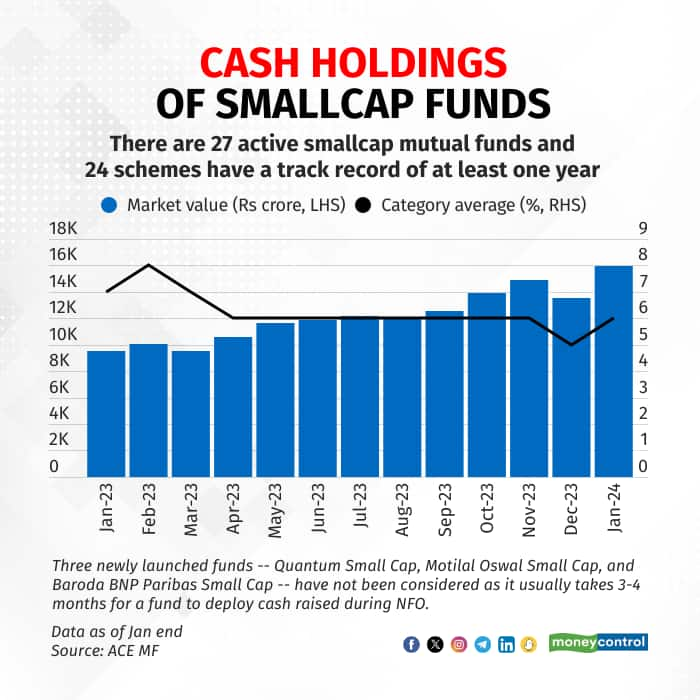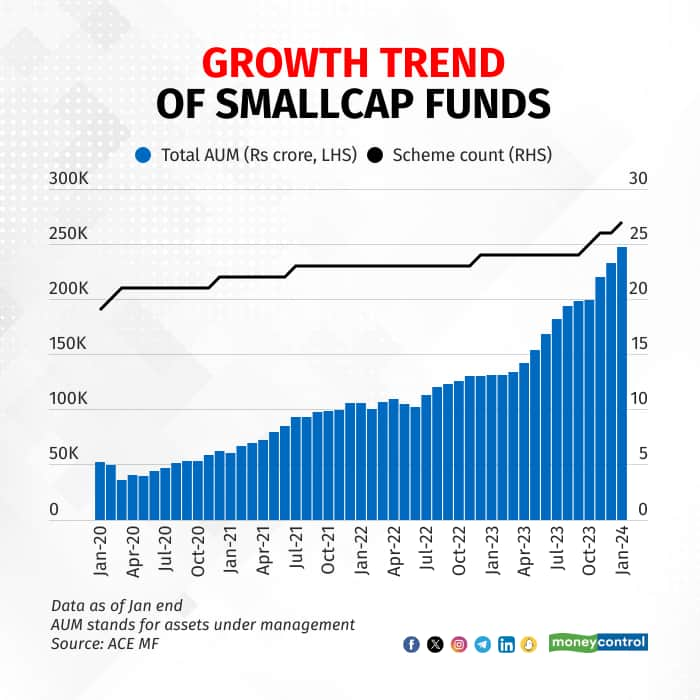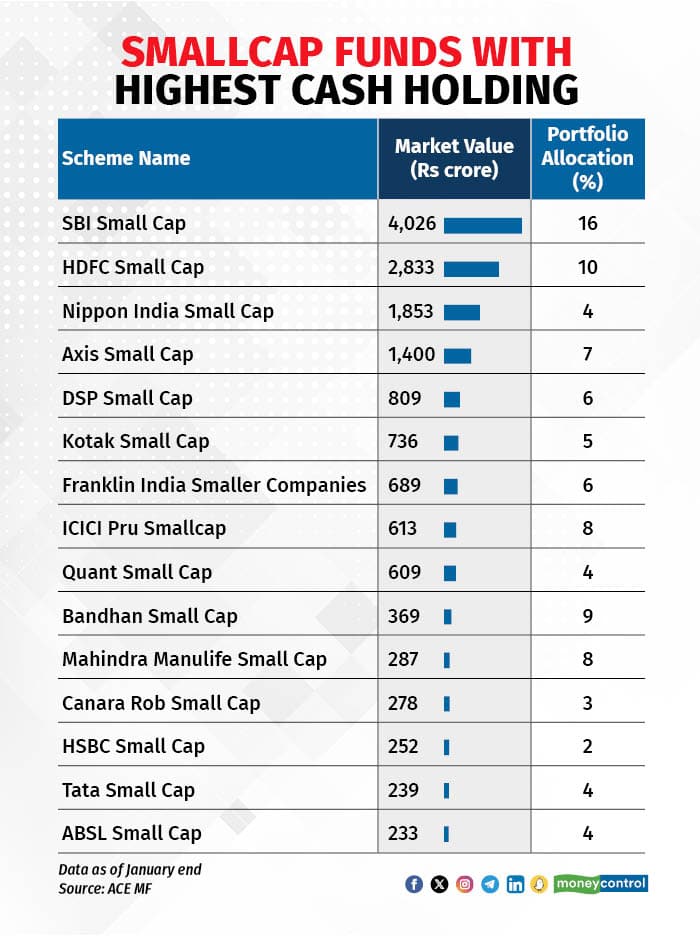Discover the latest business news, Sensex, and Nifty updates. Obtain Personal Finance insights, tax queries, and expert opinions on Moneycontrol or download the Moneycontrol App to stay updated!
The cash level of a mutual fund represents the proportion of its assets allocated to cash or cash equivalents.
The cash holding of smallcap mutual funds have remained in the range of 6-8 percent over the past one year, suggesting that fund managers largely have not been worried by the froth building up in the broader markets so far.
The cash level of a mutual fund represents the proportion of its assets allocated to cash or cash equivalents. Cash levels are an important part of managing liquidity in mutual funds.
Funds having a high cash allocation may suggest a sense of caution towards the stock market. Generally, when funds hold a significant cash position, it implies that the market is overvalued or an anticipation of favourable investment opportunities in the future.
The cash levels of smallcap funds hold significance as the Association of Mutual Funds in India (AMFI) in a letter dated February 27, asked asset management companies (AMCs) to put in place a policy to protect all investors amid continuing flows to schemes that invest in this category shares.
The mutual fund industry body has asked fund houses to take appropriate and proactive measures to protect investors, including but not limited to moderating inflows and portfolio rebalancing, etc.
Undeterred by rising inflows
For the calendar year 2023, smallcap funds saw net inflows of Rs 41,035 crore, while midcap funds saw net investments of Rs 22,913 crore. On the other hand, largecap funds witnessed net selling of Rs 2,968 crore.
Data available with ACE MF showed that as of January 2024 end, the category average cash holdings of smallcap funds stood at 6 percent, while the same stood at 7 percent at the end of January last year.

To be sure, three newly launched funds -- Quantum Small Cap, Motilal Oswal Small Cap, and Baroda BNP Paribas Small Cap -- have not been considered as it usually takes three-four months for a fund to deploy cash raised during NFO.
There are 27 active smallcap mutual funds available in the market and 24 schemes have a track record of at least one year.
Finding new ideas
Data suggests that despite incremental gains in assets under management (AUM) of smallcap schemes over the past few years, fund managers have been able to fund new ideas to invest in.
The total market value of cash holding of smallcap funds increased around 68 percent to Rs 15,972 crore at the end of January 2024. At the same time, the overall AUM of all the smallcap funds surged 90 percent to Rs 2.47 lakh crore at the end of last month against Rs 1.30 lakh crore last year.

According to experts, fund houses are also managing increased liquidity by increasing the number of stocks in a portfolio. For example, the largest category fund, Nippon India Small Cap Fund (AUM of Rs 45,894 crore) holds 209 stocks in its portfolio.
Highest cash holding
Despite overall category average cash holding of 6 percent, some smallcap fund are notable exceptions.
SBI Small Cap, which is the third biggest in the category, has the highest cash allocation at 16 percent with a market value of Rs 4,026 crore. This is followed by HDFC Small Cap (10 percent) and Bandhan Small Cap (9 percent).

To be sure, Quantum Small Cap Fund has the highest cash allocation at 20 percent, but the scheme was launched only three months back.
“Beyond the cash allocation levels, what matters in a category like smallcap is the quality of the stocks. Some funds may choose to invest in very low market capitalization stocks. The lower the market cap a fund house goes, the higher risk increases because the float is low or the liquidity very less. The cash level is a fund manager’s call, which might be high, if he or she is not able to find new ideas or because the valuations are high,” said a mutual fund distributor requesting anonymity.
Moderating inflows
Meanwhile, some AMCs have restricted investments to manage unabated inflows into smallcap funds. Kotak Mahindra Mutual Fund earlier this week stopped lumpsum investments into its smallcap fund.
Further, last year in July, Nippon India Life Asset Management and Tata Mutual Fund stopped accepting lumpsum investments into their smallcap funds.
Meanwhile, SBI MF had suspended lumpsum investments into SBI Small Cap Fund in 2020 and is currently accepting only SIP investments of up to Rs 25,000.